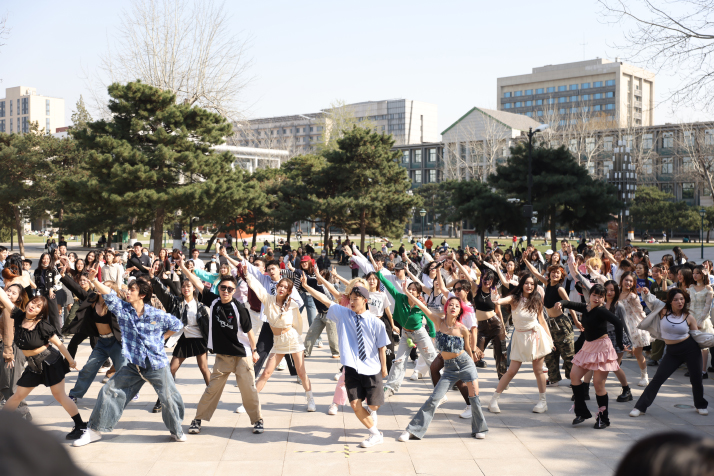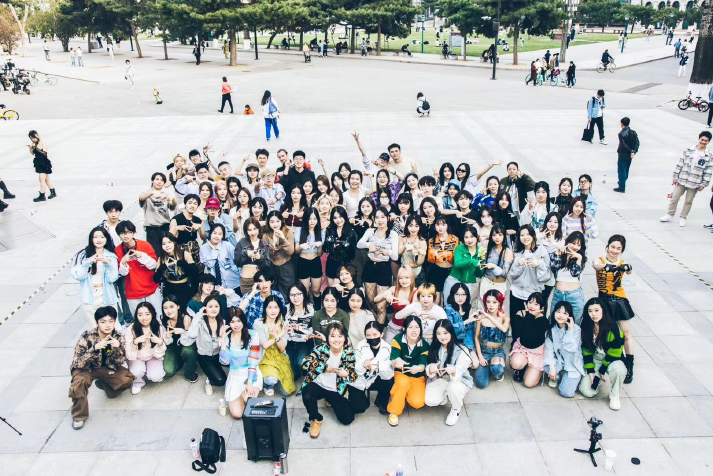| Lifestyle |
| Diverse pop culture on Chinese university campuses | |
|
|
 An annual K-pop random dance game, themed "blooming fiesta," takes place at Renmin University of China (RUC) on March 31 (WU MENGTING)
During an academic conference at Renmin University of China (RUC) in Beijing in April, participants were surprised by a constant stream of Korean pop music, or K-pop, entering the venue from one of the yards outside. The source of the music? The university's annual K-pop random dance game themed "blooming fiesta." In the game, which has become popular around the world, highlights from K-pop are played randomly and those who know the song's accompanying choreography can take to the dance floor to join in. The exciting twist is that participants don't know in advance which songs will be played at the event or in what order, challenging their dance skills and knowledge of K-pop choreography. "This is the third time we've held this kind of annual dance event on campus," Luo Yupei, head of FreeDancer, the RUC student society that organized the game, told Beijing Review, adding that the theme "blooming fiesta" symbolizes society members blooming like flowers and showing their vitality in a joyful fiesta of dance. The event's theme is different every year and last year's theme, "X Party," symbolized an undefined dance party. Luo, an undergraduate student majoring in data science and big data technology, said random dance activities mainly focus on K-pop because of its popularity and because many fans enjoy learning the choreography that comes with each new song. "The dances are also synchronized, letting people enjoy dancing in unison," she explained. "In addition, K-pop dances are usually rhythmic and energetic, making them suitable for showing off the most charming aspects of dance." However, aside from K-pop, the game also featured other kinds of street dance genres such as hiphop, popping, locking, waacking, breaking and jazz, Luo added. Let's dance FreeDancer was founded in 2010. It currently has around 300 members and a core dance crew of over 90. "We have dance teams in the genres of urban, hiphop, jazz, K-pop, popping and breaking, as well as students who lock, waack and dance in other styles," Luo said. RUC provides it with a venue for training and financial support. The society's regular activities include dance classes and rehearsals, and performances at the university's sporting events. "I mostly specialize in K-pop and jazz, and sometimes urban," first-year student Cheng Siyu, another member of FreeDancer, told Beijing Review. Cheng began studying dance when she was at secondary school. The motivation that drives Cheng to explore K-pop is that she likes to sing the songs of her favorite celebrities and dance to their dances. "Dancing is a happy thing for me. What it brings is more of a joyful emotion, and you can share happiness with friends who also love street dance and pop culture," she said. "In addition, FreeDancer is an inclusive and diverse family. There are students from all over the world, including the United States, the Republic of Korea, Ecuador and other countries and regions, and everyone gets along very well," Luo said. Dancing has gradually become a new lifestyle for young adults in China in recent years due to the popularity of talent shows and the influence of global popular culture. The increasing popularity of dance has led to new studios popping up all the time. Many dance studios are opening in megacities such as Beijing and Shanghai, targeting university students and young professionals. They utilize online systems that allow students to book classes and make payments with their smartphones. When bookings exceed a set limit, the extra students are automatically put on a waiting list. Song Jiayu, a Ph.D. student at China University of Mining and Technology-Beijing, purchased lessons at a dance studio nearby his campus. "They usually offer different kinds of street dance lessons on different days or at different times, and you can just reserve what you like," he told Beijing Review. The dance courses are usually grouped and priced according to lessons within a given period. For example, Song's course is 30 lessons in 150 days, which cost him 2,580 yuan ($356) altogether. The average price of a class at dance studios in Beijing and Shanghai is somewhere between 70 yuan ($11) and 100 yuan ($15).  "Blooming fiesta" participants pose for a group shot at RUC on March 31(GAO YUNCHENG)
An expression of youth In addition to random dance games, many universities are also hosting regular events where students go running together while listening specifically to Taylor Swift. The influential American singer-songwriter didn't visit China during her world tour this year, but that hasn't dampened the spirit of Chinese "Swifties." From February to March, hundreds of Chinese TayTay fans took trips to Japan and Singapore for her concerts and paid thousands of U.S. dollars for resold tickets, flights, and accommodation. In the Chinese mainland, Swift's concert film, Taylor Swift: The Eras Tour, took in over 100 million yuan ($13.82 million) in box office revenue during its screening from December 31, 2023 to March 12. Swift-themed dance events are also becoming popular on college campuses around the country. "Many of my friends like her and her songs," Song said. He joined Taylor Swift night running activity at RUC in April and considered it an opportunity for him to enjoy leisure time with friends amid their demanding academic studies. "We all have to have an outlet for our emotions in our hectic life. I think activities such as dancing and night running are actually what we want. We are engaging in the environment we like, and we are relieving stress at the same time," Cheng said. "The entry of overseas pop culture into campuses is a manifestation of cultural exchange and also demonstrates contemporary young Chinese adults' pursuit of individuality and self-expression," Luo said. In the process of experiencing these popular cultures, students can freely express their preferences and personalities, injecting new vitality and color into campus culture. "Besides, many of us are also exploring the possibility of combining street dance with Chinese culture, such as using Chinese songs for choreography, which is trendy," Luo added. While welcoming the entry of overseas popular culture, these students are also looking forward to the formation of unique Chinese styles and expressions in the process of cultural exchange and integration, allowing Chinese culture to shine more dazzlingly on the world stage. (Print Edition Title: Blooming Fiesta) Copyedited by G.P. Wilson Comments to taoxing@cicgamericas.com |
|
||
|
||||||||||||||||||||||||||||
|
